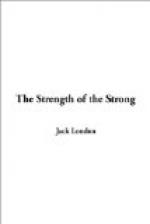Captain MacElrath did not like the sea, and had never liked it. He wrung his livelihood from it, and that was all the sea was, the place where he worked, as the mill, the shop, and the counting-house were the places where other men worked. Romance never sang to him her siren song, and Adventure had never shouted in his sluggish blood. He lacked imagination. The wonders of the deep were without significance to him. Tornadoes, hurricanes, waterspouts, and tidal waves were so many obstacles to the way of a ship on the sea and of a master on the bridge—they were that to him, and nothing more. He had seen, and yet not seen, the many marvels and wonders of far lands. Under his eyelids burned the brazen glories of the tropic seas, or ached the bitter gales of the North Atlantic or far South Pacific; but his memory of them was of mess-room doors stove in, of decks awash and hatches threatened, of undue coal consumption, of long passages, and of fresh paint-work spoiled by unexpected squalls of rain.
“I know my buzz’ness,” was the way he often put it, and beyond his business was all that he did not know, all that he had seen with the mortal eyes of him and yet that he never dreamed existed. That he knew his business his owners were convinced, or at forty he would not have held command of the Tryapsic, three thousand tons net register, with a cargo capacity of nine thousand tons and valued at fifty-thousand pounds.
He had taken up seafaring through no love of it, but because it had been his destiny, because he had been the second son of his father instead of the first. Island McGill was only so large, and the land could support but a certain definite proportion of those that dwelt upon it. The balance, and a large balance it was, was driven to the sea to seek its bread. It had been so for generations. The eldest sons took the farms from their fathers; to the other sons remained the sea and its salt-ploughing. So it was that Donald MacElrath, farmer’s son and farm-boy himself, had shifted from the soil he loved to the sea he hated and which it was his destiny to farm. And farmed it he had, for twenty years, shrewd, cool-headed, sober, industrious, and thrifty, rising from ship’s boy and forecastle hand to mate and master of sailing-ships and thence into steam, second officer, first, and master, from small command to larger, and at last to the bridge of the old Tryapsic—old, to be sure, but worth her fifty thousand pounds and still able to bear up in all seas, and weather her nine thousand tons of freight.
From the bridge of the Tryapsic, the high place he had gained in the competition of men, he stared at Dublin harbour opening out, at the town obscured by the dark sky of the dreary wind-driven day, and at the tangled tracery of spars and rigging of the harbour shipping. Back from twice around the world he was, and from interminable junketings up and down on far stretches, home-coming to the wife he had not




